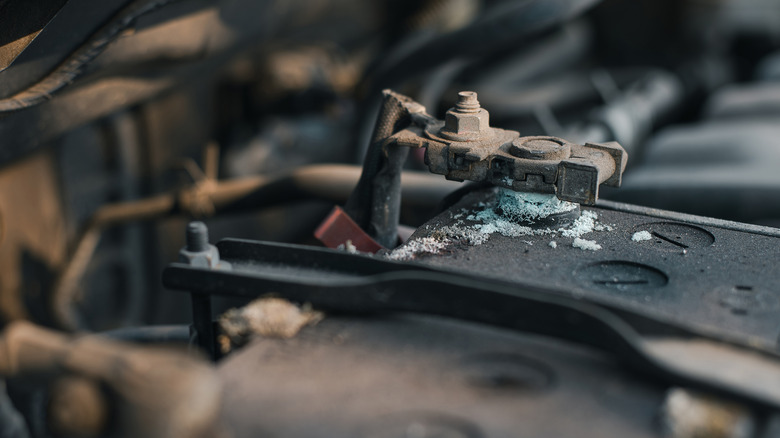Do Car Batteries Die Faster In Florida?
Extreme temperatures are one of the mortal enemies of just about any kind of battery, whether it's a recharging pack powering your drill or the large box powering your car. The chemical process that allows a battery to store and deliver electricity is highly susceptible to both extreme cold and extreme heat. When a car battery is subjected to intense heat for lengthy periods of time, the liquid within can begin to evaporate and crystalize, coating and damaging the battery's contacts and warping its plates.
Heat damage on a car battery is an ever-present concern just about anywhere, but it's especially concerning if you live in one of the southernmost United States such as Florida. Being closer to the equator, Florida, as well as similarly-positioned States like Texas, experience longer and more intense periods of heat, especially in the summer. If you're not careful, that summer Florida sun can cut down your battery's total lifespan by a year or more, as well as necessitate more regular inspection and upkeep to stave off corrosion.
Intense heat causes batteries to undergo sulfation
Lead acid batteries, the kind most commonly used as car batteries, are full of conductive battery acid. This is what allows the battery to store and discharge electricity, which is then used to power the various gadgets in your car like the dashboard and headlights. However, as with any other kind of liquid, that battery acid is susceptible to extreme shifts in temperature, the same way water in a glass can slowly evaporate if you leave it in the sun all day.
When the acid in a car battery evaporates, a process known as sulfation occurs, wherein lead-sulfate crystals begin to form inside the battery, as well as leak out of the contacts. Technically, all car batteries eventually undergo sulfation as part of their normal degradation process, which is why you can see thick coatings of corrosive crystals on the contacts of an old battery. The problem is that intense heat can cause an otherwise healthy battery to undergo sulfation prematurely. A battery that should last at least five years in good shape can have its lifespan cut down to three years as a direct result of heat-induced sulfation.
The heat of the southern States can kill a battery faster than usual
The ideal idle temperature for a car battery is around 75 degrees Fahrenheit. At this temperature, the battery will maintain its standard level of degradation, holding its charge properly without physically corroding or warping. For every 10 degrees or so above that ideal idle, a car battery's rate of discharge will double as more of its acid evaporates. Naturally, higher temperatures are part and parcel with living in the southern United States, Florida especially. While things hover at or below 75 degrees Fahrenheit in the late fall, winter, and early spring, temperatures can start ratcheting up severely as early as May and last as late as October.
According to climate data gathered by Florida State University, the average temperature in July of 2024 was 84.3 degrees Fahrenheit. That's already high enough to start putting batteries at risk, and that's not even counting unusually hot days where the temperature can get up into the 90s or even 100s. All this means that, at least during the hot months, it is possible for a car battery to die faster in Florida than elsewhere.
For drivers living in Florida and other similarly hot States, the best courses of action are preventative. You should equip your car with a specially-engineered battery for hotter, southern locales or consider switching to a more resilient AGM battery, do your best to keep your car in a shaded or temperature-controlled spot when not driving, and have your battery regularly inspected by a professional mechanic.


